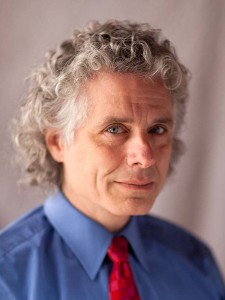
| Born: Sep 18, 1954 in Montreal, Quebec, Canada |
| Nationality: Canadian |
| Fields: Experimental Psychology |
| Famous For: Visual cognition and psycholinguistics |
| Awards: Henry Dale Prize (2004, Royal Institution), AHA Humanist of the Year award (2006), George Miller Prize (2010, Cognitive Neuroscience Society) |
Steven Pinker is of Canadian descent and is known as a popular science author, linguist, cognitive scientist and experimental psychologist. Among other endeavors, he is a professor in the psychology department at Harvard University. On an academic basis, Pinker specializes in psycholinguistics and visual cognition.
Early Years and Personal Life
Steven Arthur Pinker was born in Montreal, Quebec, Canada on September 18, 1954. His father, Harry, was an attorney, while his mother, Roslyn, was a homemaker and subsequently went on to be a high school guidance counselor and a vice-principal. He is the oldest of three children and his younger sister, Susan, also practices psychology.
Pinker has been married three times with the first two ending in divorce. He currently resides in New England with his third wife, novelist Rebecca Goldstein, and two stepdaughters, both of whom are also writers.
Contributions to Psychology
Steven Pinker is most widely recognized for his promotion of the computational theory of mind and evolutionary psychology. He conducts experiments in several realms of psychology including that of innuendo and euphemisms, the derivation of words and grammar, the regular as well as irregular language phenomena’s, development of language in children, visual attention, recognition of shapes and overall mental imagery.
His basic premise is that language is, in fact, an instinct. He goes on to argue that it is a biological adaptation which is formed by the process of natural selection.
Pinker’s Published Works
Pinker is the author of six books which he wrote over the past 17 years that are aimed at the general public. They are The Language of Instinct (1994), How the Mind Works (1997), Words and Rules (2000), The Blank Slate (2002), The Stuff of Thought (2007), and The Better Angels of Our Nature (2011).
Career Highlights
Pinker became a Doctor of Philosophy at Harvard in 1979. He did research at M.I.T. for approximately one year and was an assistant professor at both Harvard and Stanford prior to his full professorship at Harvard some years later. He was a teacher at M.I.T. for over 20 years (1982-2003) where he was a part of the Department of Brain and Cognitive Sciences.
As of 2008 he has been chairman of a board belonging to the American Heritage Dictionary which deals with word usage.
Main Theories
Along with his thesis advisor, Stephen Kosslyn, Pinker explored the world of visual cognition. Their theory was that scenes and objects that are viewed from specific vantage points create a mental image. This image is not the traditional 3D view, but rather a two and a half dimensional sketch as described by another Pinker contemporary, neuroscientist David Marr.
Working within the realm of children, Pinker promoted the theory of language acquisition. He was a proponent of the computational learning theory as well.
Awards and Recognition
In 2004, Steven Pinker was named by Time Magazine as one of the most influential thinkers and scientists in the world. Additionally, he was named by the British magazine Prospect and the American publication Foreign Policy as a top 100 public intellectual in polls conducted in 2008 and 2011 respectively.